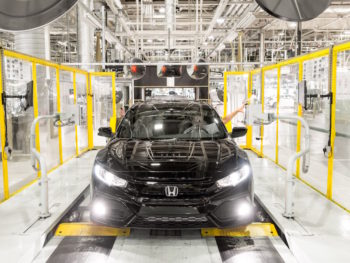UK car production slumps to lowest level since 1956
Car manufacturing in the UK fell 6.7% in 2021, its worst total since 1956, as both the chip shortage and the closure of Honda’s Swindon plant took their toll.

The closure of Honda’s Swindon site in July 2021 accounted for around a quarter of the annual decline
Only 859,575 units were produced last year in UK plants – down 61,353 on the pandemic-ravaged output of 2020 and, more tellingly, 34.0% below pre-pandemic 2019 figures.
The decline was principally down to the shortage of semiconductors but the Society of Motor Manufacturers and Traders (SMMT) said other factors were also to blame. This include the closure of Honda’s Swindon site in July 2021, which accounted for around a quarter of the annual decline.
There were some bright spots though, with a record number of battery electric vehicles and hybrids produced; volumes were up 72.0% and 16.4% respectively.
And while exports fell 5.8% to 705,826 units, they remained the mainstay of the UK car manufacturing sector. Volumes for the domestic market saw a much larger fall of 10.6%, recording a total of 153,749 units.
The SMMT also said there were grounds for optimism in 2022 with a potential £4.9bn of investment announced in 2021 on the back of the UK’s Trade and Cooperation Agreement (TCA) with the EU. It’s the highest total investment announced since 2013, and includes big plans for EVs at Vauxhall’s Ellesmere Port site and Nissan’s Sunderland facility, which is being transformed into a flagship Electric Vehicle Hub that will encompass a new battery gigafactory. There are also plans for a new gigafactory in the West Midlands, representing a £2.5bn investment.
Production is also predicted to begin recovery this year. The latest independent outlook for 2022 forecasts output to increase to more than one million units, representing a 19.7% uplift on the 2021 total, despite the loss of production in Swindon. And volumes could hit 1.1 million in 2025.
Mike Hawes, SMMT chief executive, said: “Despite this miserable year, there is optimism. With Brexit uncertainty largely overcome with the TCA deal, investments have been unleashed, most of which will help transform the sector to its zero-emission future. This is a vote of global confidence in the UK but must be matched by a commitment to our long-term competitiveness; support for the supply chain in overcoming parts shortages, help with skills and training and, most urgently, measures to mitigate the escalating energy costs which are threatening viability.”














